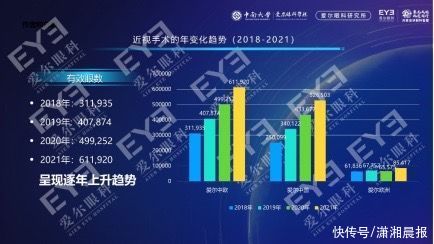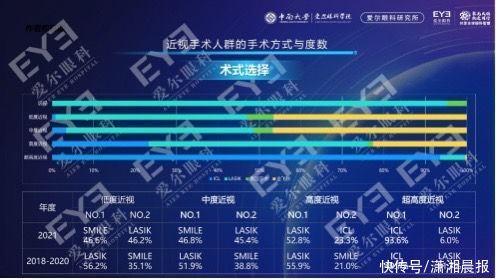
At present, there are about 2.5 billion myopic people in the world and 600 million people in China. It is predicted that by 2050, the global myopia population will reach 4.949 billion, with a prevalence rate of 52%. On May 22, the Aier Academy of Ophthalmology of Central South University and the Aier Eye Institute jointly released the “2022 China-Europe International Myopia Surgery White Paper”. It is reported that the “White Paper” selects people who have undergone myopia surgery at Aier Eye Hospital in China and Aier Eye Hospital in Europe during the four years from 2018 to 2021. The age ranges from 18 to 84 years old, and a total of nearly one million patients and more than 1.83 million eyes have effective data on myopia surgery to analyze and form a report. This is also the first big data on millions of myopia surgeries released by Aier Ophthalmology covering China and Europe.

Data shows that the incidence of myopia in Asia is higher than that in Europe and the United States, while the incidence of myopia in China ranks first in Asia, reaching 48.5%. However, the Chinese people’s awareness of myopia surgery is far lower than that of European and American countries. In 2021, only 0.7 people per 1,000 people in China will receive myopia surgery, compared with 2.6 people in the United States, 1.3 people in Europe, and 3.8 people in South Korea. However, as one of the correction methods of removing the lens, in the past four years, the number of myopia surgeries in China and Europe has been increasing year by year. Among them, the number of myopia surgeries in 2021 will nearly double compared to 2018, and surgical removal of mirrors has become a global phenomenon.

In terms of age, AIER China’s myopia surgery population tends to be younger, with an average age of 25.5 years old. The proportion of “student party” is the highest, exceeding 40%, and the peak period of myopia surgery is concentrated in the summer every year; the population of myopia surgery in Aier Europe tends to be professional, with an average age of 33.3 years old, and the “office workers” aged 25-29 account for The ratio is the highest, reaching 26%, and the peak period of myopia surgery is concentrated in the spring and autumn of each year.
It should be noted that the inertial thinking that “myopia surgery is only a ‘patent’ for young people” in my country still exists. The “White Paper” shows that although the proportion of myopia surgery population over 40 years old concentrated in first-tier cities in China is much higher than other cities, in the past four years, this group has only accounted for 3.5% of myopia surgery population, which is more than 6 times that of Europe. .
“At present, there are still some misunderstandings among the domestic people. In fact, myopia surgery is not only a ‘adult gift’ given to children by parents, but also a ‘life quality improvement gift’ given to themselves. “Professor Wang Zheng, vice chairman of the Ophthalmology Refractive Sub-Committee of the Chinese Medical Doctor Association, head of the refractive surgery group of Aier Eye Hospital Group, and general director of Guangdong Province of Aier Eye Hospital Group, said.

In terms of surgical options, laser in situ keratomileusis (LASIK) is still the majority, especially topography-guided personalized surgery The proportion is increasing year by year. New technologies for myopia surgery, such as full femtosecond laser surgery (SMILE) and implantation lens (ICL), are increasingly favored by the Chinese myopic population. Compared with 2018-2020, in 2021, full femtosecond laser surgery (SMILE) will become the first choice for low-to-medium (100-600 degree) people; in high (600-1000 degree), super high (higher than 1000 degree) myopia In the population, implantation of lens (ICL) has become the mainstream of surgery.
Professor Wang Zheng emphasized that the scope of application and postoperative advantages of each type of myopia surgery are different. There is no best surgical method, only the most suitable surgical method.
With the development of my country’s economy and the upgrading of consumption, many people with myopia not only seek to see clearly, but also want to see well. The “White Paper” shows that in China, more and more people choose personalized myopia surgery (topographic map guidance, wavefront guidance, Q value adjustment). Only in 2021, personalized myopia surgery will account for 58%, and the postoperative visual acuity will exceed 1.0 and the diopter will be stable.
According to the “White Paper” data, in China, the average uncorrected distance visual acuity 6 months after ICL lens implantation, LASIK excimer laser in situ keratomileusis, and SMILE all-femtosecond laser surgery , which are 1.11, 1.14, and 1.16, respectively. In addition, the postoperative diopter of the myopia population with various surgical procedures has become increasingly stable.
Re-examination is particularly important as a safety guarantee for myopia surgery. The “White Paper” shows that in China, Aier ophthalmology’s off-site review services account for 9.5%. As students go to study abroad, the post-surgery review service is particularly important. In order to facilitate patients’ postoperative re-examination in different places, Aier Ophthalmology has upgraded and released the “Global Re-examination Mini Program”.
Professor Wang Zheng said that with the closer integration of scientific and technological innovation and clinical application, myopia surgery will be further developed to be “personalized and customized” to meet the needs of the majority of myopic people for higher visual quality. Pursuit; based on the research of the “White Paper”, in the future, we will continue to use the synergy of AIER Ophthalmology’s global layout and digital platform to carry out multi-center research on myopia surgery covering a wider range and more people, helping to achieve “sharing global ophthalmic wisdom” ”, to promote the academic development of the industry.
Correspondent Chen Wei, reporter Zhang Shubo
News clues reveal channel: Download the “Morning Video” client from the app market and enter the topic of “Chenyi Help”; or call the morning video news hotline 0731- 85571188.